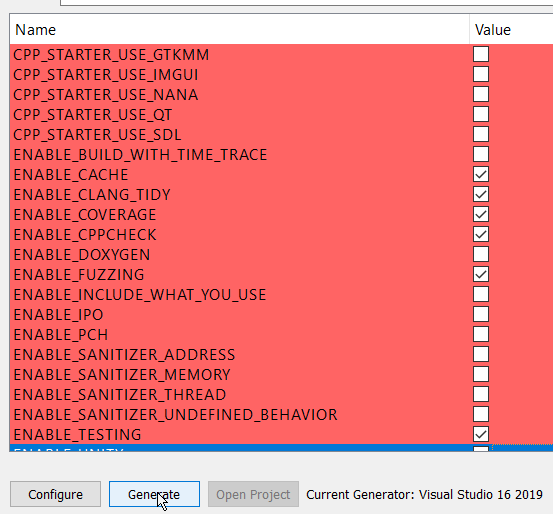13 KiB
cpp_starter_project
Getting Started
Use the Github template
First, click the green Use this template button near the top of this page.
This will take you to Github's 'Generate Repository' page.
Fill in a repository name and short description, and click 'Create repository from template'.
This will allow you to create a new repository in your Github account,
prepopulated with the contents of this project.
Now you can clone the project locally and get to work!
$ git clone https://github.com/<user>/<your_new_repo>.git
Remove frameworks you're not going to use
If you know you're not going to use one or more of the optional gui/graphics
frameworks (fltk, gtkmm, imgui, etc.), you can remove them with git rm:
$ git rm -r src/<unnecessary_framework>
Dependencies
Note about install commands:
- for Windows, we use choco.
- for MacOS, we use brew.
- In case of an error in cmake, make sure that the dependencies are on the PATH.
Necessary Dependencies
- A C++ compiler that supports C++17. See cppreference.com to see which features are supported by each compiler. The following compilers should work:
-
Install command
-
Debian/Ubuntu:
sudo apt install build-essential -
Windows:
choco install mingw -y -
MacOS:
brew install gcc
-
-
Install command
-
Debian/Ubuntu:
bash -c "$(wget -O - https://apt.llvm.org/llvm.sh)" -
Windows:
Visual Studio 2019 ships with LLVM (see the Visual Studio section). However, to install LLVM separately:
choco install llvm -yllvm-utils for using external LLVM with Visual Studio generator:
git clone https://github.com/zufuliu/llvm-utils.git cd llvm-utils/VS2017 .\install.bat -
MacOS:
brew install llvm
-
-
Install command + Environment setup
On Windows, you need to install Visual Studio 2019 because of the SDK and libraries that ship with it.
Visual Studio IDE - 2019 Community (installs Clang too):
choco install -y visualstudio2019community --package-parameters "add Microsoft.VisualStudio.Workload.NativeDesktop --includeRecommended --includeOptional --passive --locale en-US"Put MSVC compiler, Clang compiler, and vcvarsall.bat on the path:
choco install vswhere -y refreshenv # change to x86 for 32bit $clpath = vswhere -products * -latest -prerelease -find **/Hostx64/x64/* $clangpath = vswhere -products * -latest -prerelease -find **/Llvm/bin/* $vcvarsallpath = vswhere -products * -latest -prerelease -find **/Auxiliary/Build/* $path = [System.Environment]::GetEnvironmentVariable("PATH", "User") [Environment]::SetEnvironmentVariable("Path", $path + ";$clpath" + ";$clangpath" + ";$vcvarsallpath", "User") refreshenv
-
Install Command
-
Via pip - https://docs.conan.io/en/latest/installation.html#install-with-pip-recommended
pip install --user conan -
Windows:
choco install conan -y -
MacOS:
brew install conan
-
-
Install Command
-
Debian/Ubuntu:
sudo apt-get install cmake -
Windows:
choco install cmake -y -
MacOS:
brew install cmake
-
Optional Dependencies
C++ Tools
-
Install Command
-
Debian/Ubuntu:
sudo apt-get install doxygen sudo apt-get install graphviz -
Windows:
choco install doxygen.install -y choco install graphviz -y -
MacOS:
brew install doxygen brew install graphviz
-
-
Install Command
-
Debian/Ubuntu:
sudo apt-get install ccache -
Windows:
choco install ccache -y -
MacOS:
brew install ccache
-
-
Install Command
-
Debian/Ubuntu:
sudo apt-get install cppcheck -
Windows:
choco install cppcheck -y -
MacOS:
brew install cppcheck
-
-
Install Command
Follow instructions here: https://github.com/include-what-you-use/include-what-you-use#how-to-install
GUI libraries
This project can be made to work with several optional GUI frameworks.
If desired, you should install the following optional dependencies as directed by their documentation, linked here:
The following dependencies can be downloaded automatically by CMake and Conan. All you need to do to install them is to turn on a CMake flag during configuration. If you run into difficulty using them, please refer to their documentation, linked here:
- NANA
- SDL
- IMGUI: This framework depends on SFML, and if you are using Linux, you may need to install several of SFML's dependencies using your package manager. See the SFML build tutorial for specifics.
Build Instructions
Build directory
Make a build directory:
mkdir build
Specify the compiler using environment variables
By default (if you don't set environment variables CC and CXX), the system default compiler will be used.
Conan and CMake use the environment variables CC and CXX to decide which compiler to use. So to avoid the conflict issues only specify the compilers using these variables.
CMake will detect which compiler was used to build each of the Conan targets. If you build all of your Conan targets with one compiler, and then build your CMake targets with a different compiler, the project may fail to build.
Commands for setting the compilers
-
Debian/Ubuntu/MacOS:
Set your desired compiler (
clang,gcc, etc):-
Temporarily (only for the current shell)
Run one of the followings in the terminal:
-
clang
CC=clang CXX=clang++ -
gcc
CC=gcc CXX=g++
-
-
Permanent:
Open
~/.bashrcusing your text editor:gedit ~/.bashrcAdd
CCandCXXto point to the compilers:export CC=clang export CXX=clang++Save and close the file.
-
-
Windows:
-
Permanent:
Run one of the followings in PowerShell:
-
Visual Studio generator and compiler (cl)
[Environment]::SetEnvironmentVariable("CC", "cl.exe", "User") [Environment]::SetEnvironmentVariable("CXX", "cl.exe", "User") refreshenvSet the architecture using vsvarsall:
vsvarsall.bat x64 -
clang
[Environment]::SetEnvironmentVariable("CC", "clang.exe", "User") [Environment]::SetEnvironmentVariable("CXX", "clang++.exe", "User") refreshenv -
gcc
[Environment]::SetEnvironmentVariable("CC", "gcc.exe", "User") [Environment]::SetEnvironmentVariable("CXX", "g++.exe", "User") refreshenv
-
-
Temporarily (only for the current shell):
$Env:CC="clang.exe" $Env:CXX="clang++.exe"
-
Configure your build
To configure the project and write makefiles, you could use cmake with a bunch of command line options.
The easier option is to run cmake interactively:
Configure via cmake-gui:
- Open cmake-gui from the project directory:
cmake-gui .
- Set the build directory:
- Configure the generator:
In cmake-gui, from the upper menu select Tools/Configure.
Warning: if you have set CC and CXX always choose the use default native compilers option. This picks CC and CXX. Don't change the compiler at this stage!
Windows - MinGW Makefiles
Choose MinGW Makefiles as the generator:
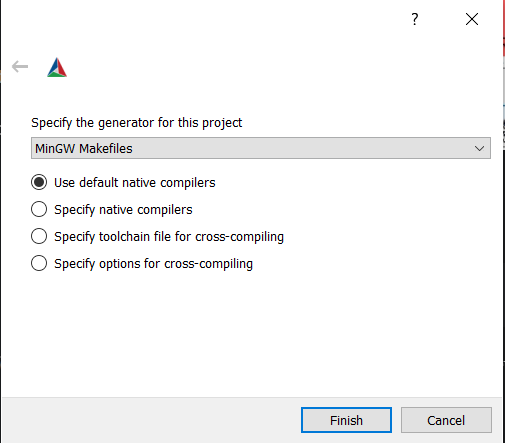
Windows - Visual Studio generator and compiler
You should have already set C and CXX to cl.exe.
Choose "Visual Studio 16 2019" as the generator:
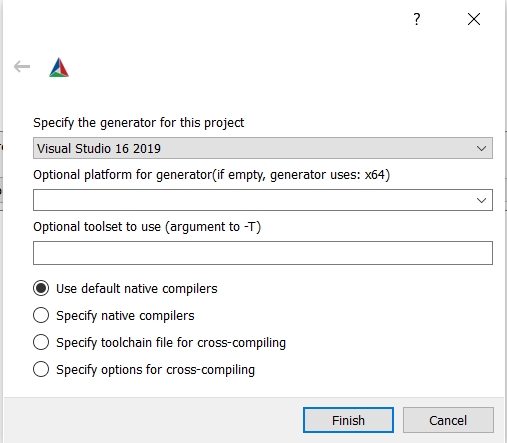
Windows - Visual Studio generator and Clang Compiler
You should have already set C and CXX to clang.exe and clang++.exe.
Choose "Visual Studio 16 2019" as the generator. To tell Visual studio to use clang-cl.exe:
- If you use the LLVM that is shipped with Visual Studio: write
ClangClunder "optional toolset to use".
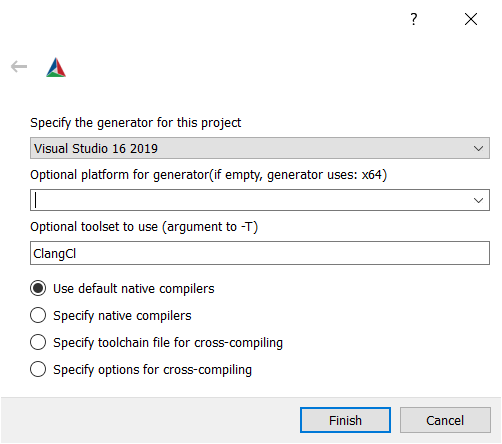
- If you use an external LLVM: write
LLVM_v142under "optional toolset to use".
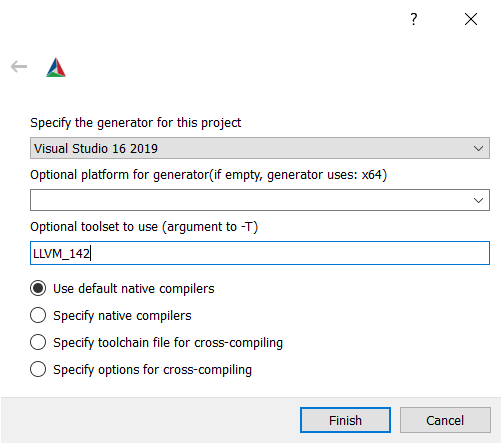
- Choose the Cmake options and then generate:
Configure via ccmake:
with the Cmake Curses Dialog Command Line tool:
ccmake -S . -B ./build
Once ccmake has finished setting up, press 'c' to configure the project,
press 'g' to generate, and 'q' to quit.
Build
Once you have selected all the options you would like to use, you can build the project (all targets):
cmake --build ./build
For Visual Studio, give the build configuration (Release, RelWithDeb, Debug, etc) like the following:
cmake --build ./build -- /p:configuration=Release
Troubleshooting
Update Conan
Many problems that users have can be resolved by updating Conan, so if you are having any trouble with this project, you should start by doing that.
To update conan:
$ pip install --user --upgrade conan
You may need to use pip3 instead of pip in this command, depending on your
platform.
Clear Conan cache
If you continue to have trouble with your Conan dependencies, you can try clearing your Conan cache:
$ conan remove -f '*'
The next time you run cmake or cmake --build, your Conan dependencies will
be rebuilt. If you aren't using your system's default compiler, don't forget to
set the CC, CXX, CMAKE_C_COMPILER, and CMAKE_CXX_COMPILER variables, as
described in the 'Build using an alternate compiler' section above.
Identifying misconfiguration of Conan dependencies
If you have a dependency 'A' that requires a specific version of another dependency 'B', and your project is trying to use the wrong version of dependency 'B', Conan will produce warnings about this configuration error when you run CMake. These warnings can easily get lost between a couple hundred or thousand lines of output, depending on the size of your project.
If your project has a Conan configuration error, you can use conan info to
find it. conan info displays information about the dependency graph of your
project, with colorized output in some terminals.
$ cd build
$ conan info .
In my terminal, the first couple lines of conan info's output show all of the
project's configuration warnings in a bright yellow font.
For example, the package spdlog/1.5.0 depends on the package fmt/6.1.2.
If you were to modify the file cmake/Conan.cmake so that it requires an
earlier version of fmt, such as fmt/6.0.0, and then run:
$ conan remove -f '*' # clear Conan cache
$ rm -rf build # clear previous CMake build
$ mkdir build && cd build
$ cmake .. # rebuild Conan dependencies
$ conan info .
...the first line of output would be a warning that spdlog needs a more recent
version of fmt.
Testing
See Catch2 tutorial

